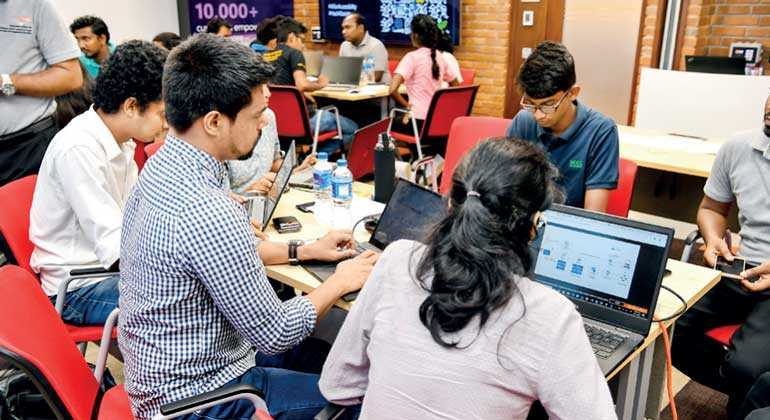Monday Feb 16, 2026
Monday Feb 16, 2026
Tuesday, 5 November 2019 00:00 - - {{hitsCtrl.values.hits}}



On 11 October, Microsoft held its first AI for Accessibility Hackathon in Sri Lanka bringing together business partners to develop prototypes of AI solutions that can transform the daily life, employability and communication for people with disabilities.
The sprint-like event was one of eight concurrent hackathons to take place across APAC (Korea, Indonesia, Malaysia, Philippines, Singapore, Sri Lanka, Thailand and Vietnam).
The full-day hackathon in Sri Lanka was held in partnership with the MJF Charitable Foundation, a non-profit charitable organisation sponsored by Dilmah Founder Merrill Joseph Fernando. Each team, which was comprised of passionate developers from the Microsoft Partner Network, included up to four members that ideated and hacked for the early identification and diagnosis of children with cerebral palsy, dysphagia, and gait disorders.
Team MillenniumIT ESP and Team Fortude + Emara won over the hearts of the judges and were adjudged joint winners of the hackathon. Team Millennium IT ESP created a self-assessment mobile app designed for children that are suffering from gait and other mobility conditions. The solution had breakthrough features harnessing augmented reality, artificial intelligence, and real-time geo-data to significantly improve the intuitiveness of gait self-assessment.
Team Fortude + Emara built a mobile app for parents and caretakers to act as a knowledge base and platform for the diagnosis of dysphagia. The solution utilises the Language Understanding Intelligent Service (LUIS) from Azure Cognitive Services. LUIS is a cloud-based API service that applies custom machine-learning intelligence to a user’s conversational, natural language text to predict overall meaning, and pull out relevant, detailed information. The winning teams will now stand a chance to pitch for grants from the Microsoft AI for Accessibility program. The program provides access to advanced Microsoft Azure cloud computing resources to individuals and organisations working on empowering people with disabilities across the world. The AI for Accessibility program awards grants to projects that build on recent advancements in Microsoft Cognitive Services and Machine Learning to develop accessible and intelligent AI solutions.
“AI can be a game-changer for people with disabilities,” said Microsoft Sri Lanka and Maldives Country Manager Hasitha Abeywardena. “Already we’re witnessing this as people with disabilities expand their use of computers to hear, see and reason with impressive accuracy.
“At Microsoft, we’ve been putting to work stronger solutions such as real-time speech-to-text transcription, visual recognition services, and predictive text functionality. AI advances like these offer enormous potential by enabling people with vision, hearing, cognitive, learning, mobility disabilities, and mental health conditions to do more.”
Disabilities can be permanent, temporary or situational. By innovating for people with disabilities, Microsoft is ensuring that technology fulfils its promise to address the broadest societal needs to help empower everyone – not just individuals with disabilities – to achieve more. All intellectual property including background and foreground are solely owned by the hackathon participants.